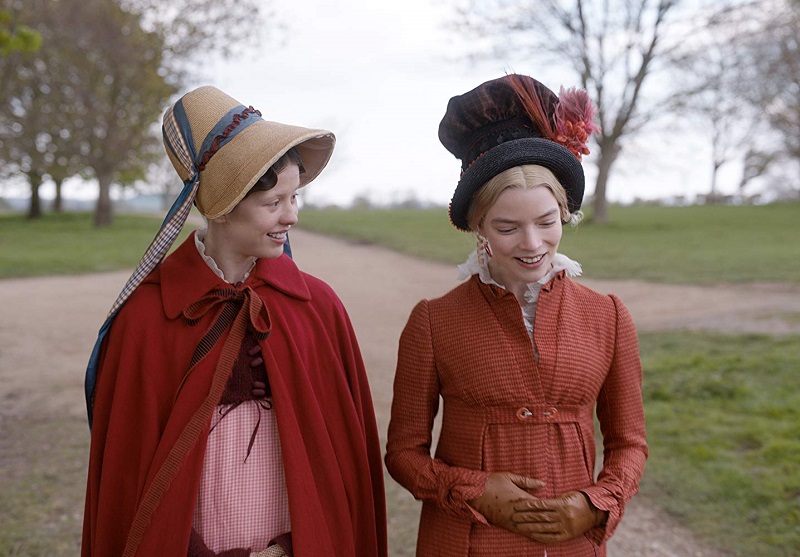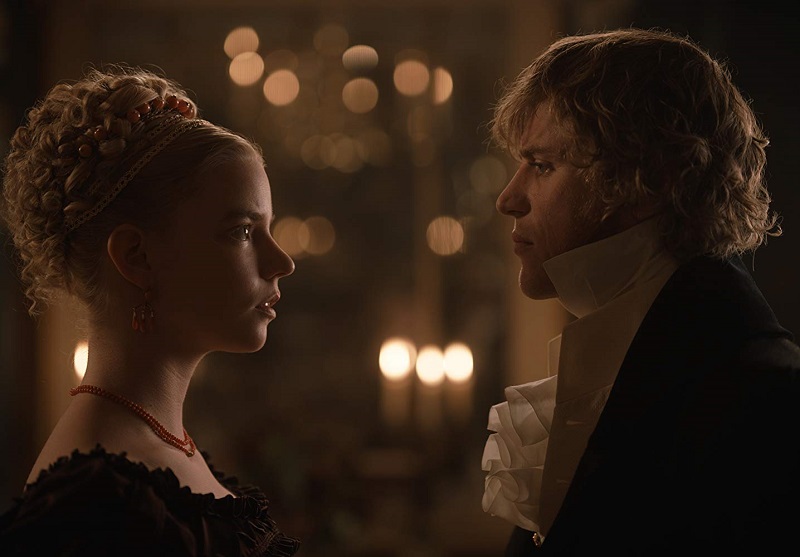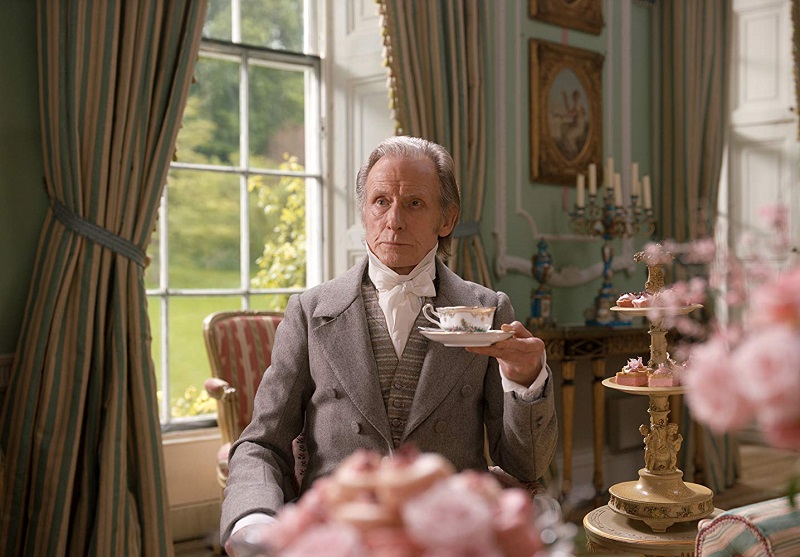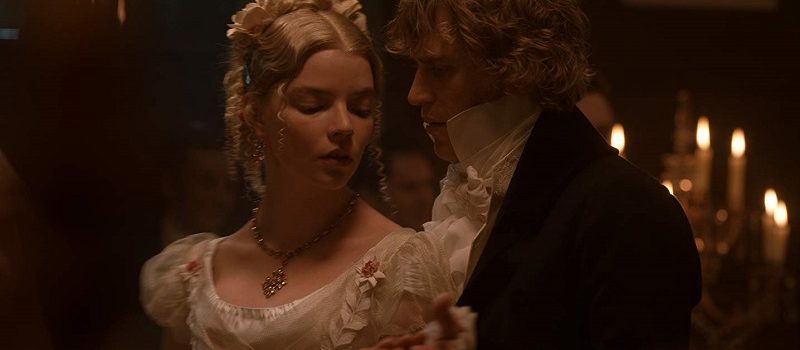The key to making an Emma that is worthy of the Jane Austen source material (and one that could possibly be welcomed after the beloved 1996 version that starred Gwyneth Paltrow in the titular role) is casting. For director Autumn de Wilde, that was the first of many divine decisions he made with his lush and luminescent production.

Starting with Anya Taylor-Joy as Emma (the camera adores her), right on through tapping Bill Nighy to portray her father, Mr. Woodhouse. De Wilde delivered on the casting front. He also saw greatness in the hiring of Alexandra Byrne as Costume Designer and Kave Quinn as Production Designer. Christopher Blauvelt’s stunning cinematography proves he was the first call, and the hair and makeup teams must be instant Oscar front-runners. I’ve been told repeatedly by director friends that 90-percent of the job is who they hire. Given the breadth of brilliance within Emma; de Wilde should be consulted on every picture as his knack for finding the right person to fill each duty is uncanny.
Taylor-Joy first grabbed our attention in the haunting The Witch and will forever have us looking at black goats with raised eyebrows! In Split, one can see how James McAvoy became so enamored of her that it became an unhinged obsession that carried over into the sequel Glass. What she brings to Emma is that intangible “it” factor that folks are always talking about. Austen’s Emma is a tough cookie to crack for any actress. In the wrong hands, she can come off as pretentious and elitist and in no way warrants our sympathy, much less endearment. Paltrow got that and those selfish traits came off as coming from a heartfelt place.
Our newest Emma found her own way of threading that finest of needles. That particularly comes across extremely well when it comes to her character’s relationship with her BFF, Harriet (Mia Goth). The two actresses impeccably pace their collective appreciation for each other in such a manner, that when their conflict does arise, it hurts our heart. We want both women to be happy and to find happiness. There is a deep caring there, and that is wholeheartedly earned.
Early on, we learn that Emma is devoted to her father and she finds absolute delight in matchmaking her friends and contemporaries.
The film essentially commences with a wedding between Mr. Weston (Rupert Graves) and Mrs. Weston (Gemma Whelan), the latter was the Woodhouse’s nanny and was almost a mother to Emma as her mother passed when she was young. Guess who set up the Westons? Emma. Her father implores her to not put her nose in everyone’s business. It’s just that she finds such selfless joy in it and has been, frankly, good at it.
Then, things get complicated when the pairing of eligible singles starts to involve her and who might be pulling her heartstrings. After all, she is 21 and in the 1800s marriage is something absolutely front and center on a woman’s mind. Emma claims to not be interested in that sort of thing, not to mention the fact that she cannot envision leaving her father behind … all alone in that massive estate.
Characters are introduced and affairs of the heart are brought up, discussed and most importantly, expertly captured by de Wilde in a way that touches our soul in all the right ways. Things truly get problematic as Austen’s tale develops and becomes firmly a “heart wants what the heart wants” romantic fable. All involved are stellar in their roles. Each brings something distinctive to their characterization. It is not simply Taylor-Joy who has a stellar line of actresses who have memorably come before her.
While watching this gloriously gorgeous production, recalling past productions of Emma—or any other random thought that pops in one’s mind while watching a film—as is known to happen, never occurs. It is the rare film that centers you and grabs and maintains your attention meticulously over two hours. Emma is that film. There was too much to bask in up on the screen. Whether it’s the lush landscape, the pitch perfect performances, exquisite costumes, majestic estates or opulent farmland … something is continually catching your eyes, ears, mind or soul.

Taylor-Joy may not inject the wholehearted warmth that Paltrow brought with her performance, but what Emma, circa 2020, brings to this production is a more astute characterization for the character. Taylor-Joy isn’t afraid to dive into the selfish and socially aloof aspect of the Emma persona. How many 21-year-olds are that self-aware? By emphasizing that aspect of her persona, her redemption and realization as the film progresses is all the more powerful and refreshingly real. She is radiant and lights up the screen every second she’s involved in a scene—which is practically all of them. Here’s hoping that her take on Emma has the same effect on her career that Paltrow’s did (which arrived the year Taylor-Joy was born!). Now, I’m not saying that three years from now, the young actress will win an Academy Award as Paltrow did.
Nighy is a scene-stealer. Always has been, always will be. From the moment he arrives on the screen in Emma, that is firmly established. Whether it’s adding his color commentary to the minister’s (Mr. Elton, Josh O’Connor) pronunciation or even something as simple as arriving at the bottom of a flight of stairs after sauntering his way down them, there’s a flair to Nighy’s take on Mr. Woodhouse that is just sublime.
Johnny Flynn delights as George Knightley. As he portrays him, it’s easy to root for the guy to figure things out already. Then again, if he did … we wouldn’t have much of a movie! It’s a tough task to create a character who seems unapproachable and self-centered, when in fact he is selfless and has a heart of gold. Our Frank Churchill, circa 2020, is Callum Turner. The London native excels with the little things that an actor brings to a part as he makes his Churchill distinctively his own. It’s a refreshing take. That is also the case with Miranda Hart and her terrific delivery of Miss Bates. The slightly aloof and talks too much woman has the pity of many due to her lot in life. It is her turn as Miss Bates that makes the defining “moment” between her and Emma all the more painful. You know which scene we’re talking about! Both actresses bring so much to their roles that by the time “that” socially awkward instance occurs, you could hear a pin drop in the theater from all those jaws-agape.

Even though this is a story often told, as you probably know Clueless was even inspired by Austen’s beautiful book, it still feels fresh in the hands of de Wilde. The helmer not only has hired all the best people, but he himself makes Emma 2020 a true triumph. His shot selection and those editorial decisions that are made in the editing bay, add layers of life to Austen’s work. It is easy to see why this production got the green light. It would have been easy for a studio head to say “no,” especially given the place in people’s heart that the Paltrow production possesses. After experiencing the helmer’s vision and passion for the project in that pitch meeting, one can imagine the soul at the other end of that pitch being overcome by unbridled anticipation to witness Emma. Hopefully after reading this review and experiencing that Emma trailer, you will be overcome by the same sentiment.
Grade: A

